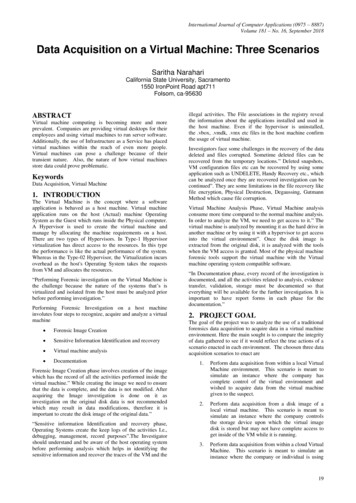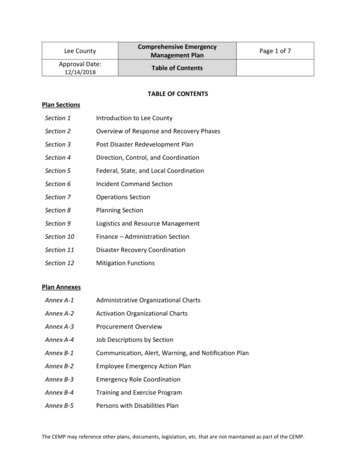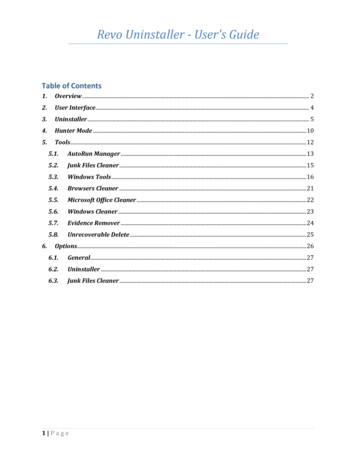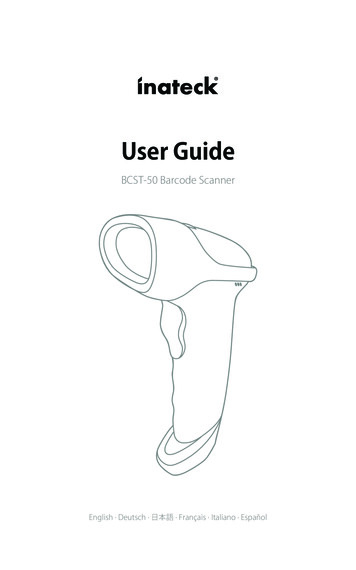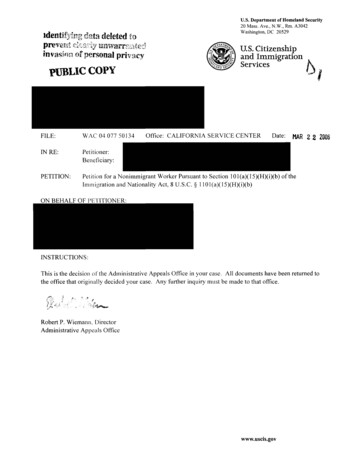
Transcription
dentifj-kgdata deleted l oprc.area@rr-:s ,iynn%va rc-,nte3invasirln of personal privncyPUIBLICLC COPYU.S. Department of Homeland Security20 Mass. Ave., N.W., Rm. A3042Washington, DC 20529U. S. Citizenshipand ImmigrationServicesMAR 2 2 2006FILE:WAC 04 077 50134PETITION:Petition for a Nonirnmigrant Worker Pursuant to Section lOl(a)(l S)(H)(i)(b) of theImmigration and Nationality Act, 8 U.S.C. 5 1 101(a)(l S)(H)(i)(b)Office: CALIFORNIA SERVICE CENTERDate:This is the decision of'the Administrative Appeals Office in your case. All doculnents have been returned tothe office that originally decided your case. Any further inquiry must be made to that office.Robert P. Wiemann. DirectorAdministrative Appeals Office
WAC 04 077 50134Page 2DISCUSSION: The service center director denied the nonimmigrant visa petition and the matter is now beforethe Administrative Appeals Office (AAO) on appeal. The appeal will be dismissed. The petition will be denied.The petitioner is a motel that seeks to employ the beneficiary as a full-time accountant. The petitionerendeavors to classify the beneficiary as a nonimmigrant worker in a specialty occupation pursuant totj 101(a)(l 5)(H)(i)(b) of the Imlnigration and Nationality Act (the Act), 8 U.S.C. 8 1 10 l(a)(l 5)(H)(i)(b).The director denied the petition because the proffered position is not a specialty occupation. On appeal,counsel submits a brief and additional evidence, including Internet job postings, a letter from the petitioner,organizational charts, and information about the petitioner's 13 hotel locations.Section 214(i)(l) of the Act, 8 U.S.C. tj 11 84(i)(l), defines the term "specialty occupation" as an occupationthat requires:(A)theoretical and practical application of a body of highly specialized knowledge, and(B)attainment of a bachelor's or higher degree in the specific specialty (or its equivalent)as a minimum for entry into the occupation in the United States.Pursuant to 8 C.F.K. 214.2(h)(4)(iii)(A), to qualify as a specialty occupation, the position must meet one ofthe following criteria:(I)A baccalaureate or higher degree or its equivalent is normally the minimum requirementfor entry into the particular position;(2)The degree requirement is common to the industry in parallel positions among similarorganizations or, in the alternative, an employer may show that its particular position isso complex or unique that it can be performed only by an individual with a degree;(3)The employer normally requires a degree or its equivalent for the position; or(4)The nature of the specific duties is so specialized and complex that knowledge required toperform the duties is usually associated with the attainment of a baccalaureate or higherdegree.Citizenship and Immigration Services (CIS) interprets the term "degree" in the criteria at 8 C.F.R.tj 214.2(h)(4)(iii)(A) to mean not just any baccalaureate or higher degree, but one in a specific specialty that isdirectly related to the proffered position.The record of proceeding before the AAO contains: (1) Form 1-129 and supporting documentation; (2) thedirector's request lbr additional evidence; (3) the petitioner's response to the director's request; (4) thedirector's denial letter; and (5) Form I-290B and supporting documentation. The AAO reviewed the record inits entirety before issuing its decision.The petitioner is sceliing the beneficiary's services as a filll-time accountant. Evidence of the beneficiary'sduties includes: thc 1-129 petition; the petitioner's January 12, 2004 letter in support of the petition; and the
WAC 04 077 501 3-1Page 3petitioner's response to the director's request for evidence. According to this evidence, the beneficiary wouldperform duties that entail: preparing financial statements, payroll, and sales and payroll tax; reconciling thegeneral ledger accounts; maintaining payable and receivable records for clients; preparing inventory recordsand depreciation schedules to apply to capital assets; preparing compliance reports for tax authorities;reconciling cash receipts to daily deposits; and analyzing operating statements, reviewing cost-controlprograms, and making strategy recommendations to management. The petitioner indicated that a qualifiedcandidate for the job would possess a bachelor's degree in business administration, accounting, or a relatedfield.The director found that the proffered position was not a specialty occupation because the job is not anaccountant position: it is a bookkeeper or an accountinglauditing clerk position. Citing to the Department ofLabor's (DOL) Oc c yationalOzrtlook Handbook (Handbook), 2004-2005 edition, the director noted that theminimum requirement for entry into the position was not a baccalaureate degree or its equivalent in a specificspecialty. The director found further that the petitioner failed to establish any of the criteria found at 8 C.F.R.9 2 14.2(h)(4)(iii)(A).On appeal, counsel states, in part, that the proffered position is that of an accountant, which requires theapplication of Generally Accepted Accounting Principles (GAAP). Counsel states further that the generalmanagers of the petitioner's hotels perform the petitioner's bookkeeping duties. Counsel submits supportingdocumentation including Internet job postings, a letter from the petitioner, organizational charts, andinformation about the petitioner's 13 hotel locations.Upon review of the record, the petitioner has established none of the four criteria outlined in 8 C.F.R.9 214.2(h)(4)(iii)(A). Therefore, the proffered position is not a specialty occupation.The AAO turns first to the criteria at 8 C.F.R. fj 214,2(h)(4)(iii)(A)(I) and (2): a baccalaureate or higherdegree or its equivalent is the normal minimum requirement for entry into the particular position; a degreerequirement is common to the industry in parallel positions among similar organizations; or a particularposition is so complex or unique that it can be performed only by an individual with a degree.Factors often consitlered by CIS when determining these criteria include: whether the Handbook reports that theindustry requires a degree; whether the industry's professional association has made a degree a minimum entryrequirement; and \thether letters or affidavits from firms or individuals in the industry attest that such firms"routinely employ and recruit only degreed individuals." See Shanti, Inc. v. Reno, 36 F. Supp. 2d 1151, 1165 (D.Minn. 1999)(quotingHir*d/Blaker Corp. v. Sava, 712 F. Supp. 1095, 1102 (S.D.N.Y. 1989)).The AAO routinelq consults the Handbook for its information about the duties and educational requirements ofparticular occupations. The AAO does not concur with counsel that the proffered position is that of an accountant.The Handbook, 2006-2007 edition, reveals that specific job duties vary widely among the four major fields ofaccounting: public. llanagement,government accounting, and internal auditing. The closest category to theproffered position is the management accountant. In the Handbook, management accountants - also called cost,managerial, industrial, corporate, or private accountants - record and analyze the financial information of thecompanies for which they work. Other responsibilities include budgeting, performance evaluation, and cost andasset management. Usually, management accountants are part of executive teams involved in strategic planningor new-product development. They analyze and interpret the financial information that corporate executives needto make sound business decisions. They also prepare financial reports for nonmanagement groups, including
WAC 04 077 50134Page 4stockholders, creditors, regulatory agencies, and tax authorities. Within accounting departments, they may workin various areas, including financial analysis, planning and budgeting, and cost accounting.In this case, information on tlie petition reflects that tlie petitioner is a motel with 12 employees and a grossannual income of 1.5 million. Counsel's statement that the proposed duties require application of GAAP isnoted. As shown in tlie Handbook, bookkeeping, accounting, and auditing clerks produce financial statementsand prepare reports and summaries for supervisors and managers, which would be used by them to makesound business decisions. Further, the Handbook reports that employers require most financial clerks to haveat least a high school diploma, and for bookkeepers and accounting clerks, they often require an associate'sdegree in business or accounting.' The Ha dbook'ssubsection Sources of Additional Information" refers thereader to the Internet site for tlie Accreditation Council for Accountancy and Taxation (ACAT), theprofessional organi ationthat provides the credentials Accredited Business Accountant@/Accredited BusinessAdvisors@ (ABA).' That Internet site reveals that a degree in accounting or a related specialty is not requiredfor ABA accreditation. Eligibility for the eight-hour comprehensive examination for the ABA credentialrequires three years of "verifiable experience in accounting, taxation, financial services, or other fieldrequiring a practical and theoretical knowledge of the subject matter covered on the ACAT Comprehensive xamination." "Up to two" of the required years of work experience "may be satisfied through collegecredit."The evidence of record fails to convey that tlie beneficiary's specific performance of the record's list ofgeneralized duties \voilld require tlie theoretical and practical application of highly specialized knowledge4attained by at least a baclielor's degree or the equivalent in accounting or any other specific specialty.' According to the website for Skyline College, a community college located in San Mateo, California,(www.skvlil ecollege. ' et),an associate's degree in business or accounting would involve learning thefundamentals about financial accounting principles and concepts, balance sheets, income statements, cashflow statements, the GAAP, forecasting, budgeting, cost accounting, break even analysis, developing andoperating a computerized accounting system using tools such as QuickBooks, QuickBooks Pro, or Peachtree,an integrated commercial accounting software package that is used to review, differentiate, and interpretaccounting concepts and data in a multitude of business situations. Thus, an associate's degree would provideknowledge about the GAAP and accounting techniques that serve tlie needs of management and facilitatedecision-making.At its Internet site (littp:/iwww. isacct.orglacat.asp),the National Society of Accountants describes ACAT asfollows:The Accretlitation Council for Accountancy and Taxation (ACAT) is an independent accreditingand monitoring organization affiliated with the National Society of Accountants. ACAT accreditsprofessionals in independent practice who have demonstrated measurable knowledge of theprinciples, practices, and ethical standards of accounting, taxation, information technology and relatedfinancial services.The ACAT Internet site (http://www.acatcrede itials.org/index.lt nl)states that the examination tests"proficiency in financial accounting, reporting, statement preparation, taxation, business consulting services,business law, and ethics."4These duties entail primarily the business or accounting associate degree-level activities listed on SkylineCollege website.
WAC 04 077 50134Page 5-Counsel's assertion on appeal that the petitioner's 13 general managers of its 13 hotel locations will act asbookkeepers and transmit the financial information for their respective hotels to the "Corporate Office whereit is analyzed and complied pursuant to GAAP standards" is noted. This expanded description of dutiesdescriptions, which indicate that the beneficiary would perform duties for theSan Francisco, California, not for 13 hotel locations.atFurthermore, the record contains no evidence thatserves as a "corporate office" for 13hotel locations. On appeal, a petitioner cannot offer a new pos tionto t e beneficiary, or materially change aposition's title, its level of authority within the organizational hierarchy, or the associated job responsibilities.The petitioner must establish that the position offered to the beneficiary when the petition was filed meritsclassification as a managerial or executive position. Matter of Michelin Tire Corp., 17 I&N Dec. 248, 249(Reg. Comm. 1978). A petitioner may not make material changes to a petition in an effort to make a deficientpetition conform to CIS requirements. See Matter of Izummi, 22 I&N Dec. 169, 176 (Assoc. Comm. 1998). Itis incumbent upon the petitioner to resolve any inconsistencies in the record by independent objectiveevidence. Any attempt to explain or reconcile such inconsistencies will not suffice unless the petitionersubmits competent objective evidence pointing to where the truth lies. Matter of Ho, 19 I&N Dec. 582, 59192 (BIA 1988). Doubt cast on any aspect of the petitioner's proof may, of course, lead to a reevaluation of thereliability and sufficiency of the remaining evidence offered in support of the visa petition. Matter of Ho, 19I&N Dec. 582,591 (BIA 1988).hMoreover, the level of income generated by the petitioner has a direct and substantial bearing on the scope anddepth of the beneficiary's proposed duties. Responsibility for the financial transactions described above differsvastly from responsibility associated with a far larger income or fiom a firm that is responsible for the accountingwork of many clients. Counsel's assertion on appeal that the proffered position is that of an accountant is noted.Without documentary evidence to support the claim, the assertions of counsel will not satisfy the petitioner'sburden of proof. The unsupported assertions of counsel do not constitute evidence. Matter of Obaigbena, 19I&N Dec. 533,534 (BIA 1988); Matter of Laureano, 19 I&N Dec. 1 (BIA 1983); Matter of Ramirez-Sanchez,17 I&N Dec. 503, 506 (BIA 1980). Consequently, the petitioner fails to establish that a baccalaureate or higherdegree or its equivalent is the normal minimum requirement for entry into the particular position.The duties described in the Handbook do not primarily apply to the proffered position. According to theHandbook, accountants prepare financial reports for nonmanagement groups, including stockholders, creditors,regulatory agencies, and tax authorities, and usually, they are part of executive teams. The beneficiary will not bepart of an executive team. Nor will the beneficiary prepare financial reports for nonmanagement groups such asstockholders, creditors, regulatory agencies, and tax authorities. Given this significant dissimilarity, the scope andcomplexity of the beneficiary's duties and responsibilities do not rise to the level of an accountant. Consequently,a bachelor's degree in accounting or a related field - which the DOL states is required for a managementaccountant - would not be required for the proffered position. A review of the Handbook finds that the proposedduties are primarily the duties of bookkeeping, accounting, auditing and financial clerks. No evidence in theHandbook indicates that a baccalaureate or higher degree, or its equivalent, is required for these positions.Regarding parallel positions in the petitioner's industry, the petitioner submitted Internet job postings foraccountants. There is no evidence, however, to show that the employers issuing those postings are similar tothe petitioner, or that the advertised positions are parallel to the instant position. The advertisements are foraccountants in the investment and pharmaceutical industries. The petitioner's industry, however, is notrepresented. Thus, the advertisements have no relevance.
WAC 04 077 50134Page 6The record also does not include any evidence from firms, individuals, or professional associations regardingan industry standard, or documentation to support the complexity or uniqueness of the proffered position. Thepetitioner, therefore, has not established the criteria set forth at 8 C.F.R. § 214.2(h)(4)(iii)(A)(l) or (2).The AAO now t r ntos the criterion at 8 C.F.R. 5 214.2(11)(4)(iii)(A)(3) - the employer normally requires adegree or its equivalent for the position. As counsel does not address tliis issue on appeal, it will not be discussedfurther. The evidence of record does not establish tliis criterion.Finally, the AAO turns to the criterion at 8 C.F.R. 21 4.2(11)(4)(iii)(A)(4) - the nature of the specific duties isso specialized and complex that knowledge required to perform the duties is usually associated with theattainment of a baccalaureate or higher degree.To the extent that they are depicted in the record, the duties do not appear so specialized and complex as torequire the highly specialized knowledge associated with a baccalaureate or higher degree, or its equivalent,in a specific specialty. Therefore, the evidence does not establish that the proffered position is a specialtyoccupation under 8 C.F.R. fj 214.2(h)(4)(iii)(A)(4).As related in the discussion above, the petitioner has failed to establish that the proffered position is aspecialty occupation. Accordingly, the AAO shall not disturb the director's denial of the petition.Beyond the decision of the director, the petitioner has not established that the beneficiary is qualified toperform the duties of a specialty occupation. The record does not contain a copy of the beneficiary'suniversity transcripts. Moreover, the record contains no independent evidence that the credentials evaluator isan official who has authority to grant college-level credit for training and/or experience in the specialty at anaccredited college or university which has a program for granting such credit based on an individual's trainingand/or work experience, as required by 8 C.F.R. fj 2 14.2(11)(4)(iii)(D)(l). For these additional reasons, thepetition may not be approved.The burden of proof in these proceedings rests solely with the petitioner. Section 291 of the Act, 8 U.S.C. 1361.The petitioner has not sustained that burden.ORDER:The appeal is dismissed. The petition is denied.
an integrated commercial accounting software package that is used to review, differentiate, and interpret accounting concepts and data in a multitude of business situations. Thus, an associate's degree would provide . 4 These duties entail primarily the business or accounting associate degree-level activities listed on Skyline College website.

